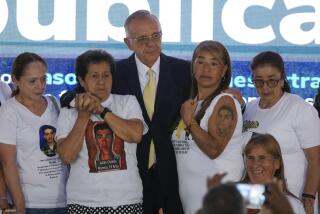Colombia FARC negotiators say they are taking up arms again
- Share via
BOGOTA, Colombia — A group of former peace negotiators for the Revolutionary Armed Forces of Colombia announced they are taking up arms again following what they considered the failure of conservative President Ivan Duque to guarantee their political rights after the signing of a landmark peace deal.
In a video published before dawn Thursday, former chief rebel negotiator Luciano Marin appeared alongside a group of some 20 heavily armed guerrillas condemning Duque and his supporters for standing by idly as hundreds of leftist activists and more than 150 former rebels have been killed since the 2016 peace deal, which sought to end a half century of fighting in the South American country.
“When we signed the accord in Havana we did so with the conviction that it was possible to change the life of the most humble and dispossessed,” Marin, better known by his alias Ivan Marquez, said in the more than 30 minute video. “But the state hasn’t fulfilled its most important obligations, which is to guarantee the life of its citizens and especially avoid assassinations for political reasons.”
In the video, Marin, speaking from what he said were Colombia’s western jungles in the Amazon rain forest, stood alongside several former FARC leaders, including ideologue Seuxis Hernandez, alias Jesús Santrich, who abandoned the peace process after his arrest was sought by the U.S. on drug charges.
Rodrigo Londono, who had been the FARC’s top military commander and now heads its political party known by the same acronym, distanced himself from his former comrades, with whom relations have been strained in the past year. In an interview with Blu Radio he apologized to his fellow Colombians and the international community, saying that the vast majority of rebels remain committed to the peace process despite the rising security risks.
“I have mixed feelings,” said Londono, who is better known by his alias Timochenko. “It’s an unfortunate development, but at the same time it leaves things clearer and ends the ambiguity because we had been facing a complex situation for some time.”
Some 7,000 rebels handed over their weapons to observers from the United Nations as part of the deal negotiated with the support of the U.S., Cuba and Norway. But smaller rebel groups and drug trafficking gangs have filled the void left by the withdrawing FARC rebels, leaving many Colombians frustrated with the slow pace of implementing the accord.
There was no immediate reaction from the Duque government.
More to Read
Sign up for Essential California
The most important California stories and recommendations in your inbox every morning.
You may occasionally receive promotional content from the Los Angeles Times.










